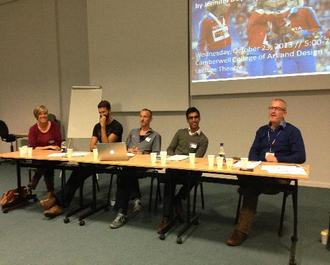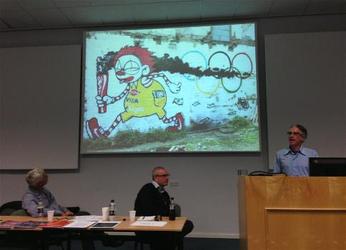sport, leisure and social justice, university of brighton
19-20 september 2013
In his 2004 American Sociological Association Presidential address, Michael Burawoy called for a public sociology. Sociologists should engage with the wider public and “translate private troubles into public issues”, as C Wright Mills argued in the Sociological Imagination. These principles underpinned the Sport, Leisure and Social Justice Conference at the University of Brighton in September 2013, supported by the PSA Sport and Politics study group. The conference was hosted by the Sport and Leisure Cultures research cluster, and organised by Daniel Burdsey, Jayne Caudwell, Megan Chawansky, Mark Doidge and Belinda Wheaton. A range of academics, practitioners and activists arrived from all over the world to critically engage with the role of sport within social justice.
The conference commenced with two keynote talks from people engaged in community work. David Wolff from the University of Brighton’s Community University Partnerships Programme (CUPP) kicked off the conference with a discussion of how sport has been used as a vehicle in community programmes in Sussex. This was followed by a lively address by Jules Boykoff from the Pacific University, Oregon. Boykoff presented his work on activism within the anti-Olympics movements at Vancouver 2010 and London 2012. The Olympics provides a “moment of movements” as it provides the time and space to focus the attention of activists. Discussing these keynotes, Peter Donnelly from the University of Toronto drew on the work of Burawoy and Mills to emphasise the need for a public sociology of sport. As a major cultural practise, sport provides a number of opportunities for social intervention. Significantly, sport provide a public space for activism.
The conference commenced with two keynote talks from people engaged in community work. David Wolff from the University of Brighton’s Community University Partnerships Programme (CUPP) kicked off the conference with a discussion of how sport has been used as a vehicle in community programmes in Sussex. This was followed by a lively address by Jules Boykoff from the Pacific University, Oregon. Boykoff presented his work on activism within the anti-Olympics movements at Vancouver 2010 and London 2012. The Olympics provides a “moment of movements” as it provides the time and space to focus the attention of activists. Discussing these keynotes, Peter Donnelly from the University of Toronto drew on the work of Burawoy and Mills to emphasise the need for a public sociology of sport. As a major cultural practise, sport provides a number of opportunities for social intervention. Significantly, sport provide a public space for activism.

The first roundtable discussion followed addressed the role of public intellectualism and activism. Starting this debate was Mark Perryman, a journalist, activist and research fellow at the University of Brighton. Perryman’s provocative discussion focussed on the transition to the neo-liberal university and the marketisation of higher education which have restricted the conditions that allow public intellectuals to emerge. Jayne Caudwell (University of Brighton) also highlighted the transformation and marketisation of universities as a major factor affecting activism within the academy. The session was concluded with a presentation on the balancing act that operates between activism and academic research; Payoshni Mitra spoke of her activism around intersex athletes in India.
Sporting interventions in the Sport for Development and Peace (SDP) sector comprised a number of sessions. It also formed the basis for a roundtable discussion mixing academics and practitioners. Simon Darnell (Durham University) argued that research into the SDP sector should engage with the full range of stakeholders, from volunteers to policy makers. Alexander Cardenas (Ulster University) reflected on his work with the Goals for Peace in Colombia and the Philippines and the struggles and synergies of being an early career academics and an activist. Reflecting on her work with sporting interventions targeting girls, Megan Chawansky (University of Brighton) highlighted the commercialism of feminism within the SDP movement. Finally Pete Beeley from Fight for Peace International spoke of the variety of sporting initiatives being undertaken in Rio de Janeiro to help move young people away from drugs and violence.
A number of parallel sessions over the two days dealt with a range of studies of sport and activism, including one session on political activism amongst Italian football fans, Israeli football fans and a community club in Bristol. Elsewhere papers were given on the impact of mega events such as the Olympics and All Africa Games.
Sporting interventions in the Sport for Development and Peace (SDP) sector comprised a number of sessions. It also formed the basis for a roundtable discussion mixing academics and practitioners. Simon Darnell (Durham University) argued that research into the SDP sector should engage with the full range of stakeholders, from volunteers to policy makers. Alexander Cardenas (Ulster University) reflected on his work with the Goals for Peace in Colombia and the Philippines and the struggles and synergies of being an early career academics and an activist. Reflecting on her work with sporting interventions targeting girls, Megan Chawansky (University of Brighton) highlighted the commercialism of feminism within the SDP movement. Finally Pete Beeley from Fight for Peace International spoke of the variety of sporting initiatives being undertaken in Rio de Janeiro to help move young people away from drugs and violence.
A number of parallel sessions over the two days dealt with a range of studies of sport and activism, including one session on political activism amongst Italian football fans, Israeli football fans and a community club in Bristol. Elsewhere papers were given on the impact of mega events such as the Olympics and All Africa Games.

A key aspect of the conference was to link academic ideas with everyday practise. The conference finished on the second day with a roundtable by practitioners. This engaging discussion included Kuljit Randhawa from the Asian Football Network, Alister O’Loughlan from the Urban Playground Team in Brighton, Željko Blaće from qSport in Croatia, and Lou Englefield from Pride Sports. The participants presented their own activist areas engaging with local communities and global project, and answered questions on the importance of social justice to their work. When commenting on the role of the academy to their practise, Kujit Randhawa said that “to change policy we need to do it together”. Željko Blaće agreed and that “through collaboration with academics, we can make the change quicker”. Jules Boykoff (Pacific University, Oregon) and Alan Tomlinson (University of Brighton) provided some concluding comments, with Tomlinson highlighting the importance of making space in the neoliberal university for critical engagement with the wider public. Through dialogue between academics and practitioners, sociology of sport can start to affect a real change in the wider social world.
Report by Dr Mark Doidge, University of Brighton
Report by Dr Mark Doidge, University of Brighton
